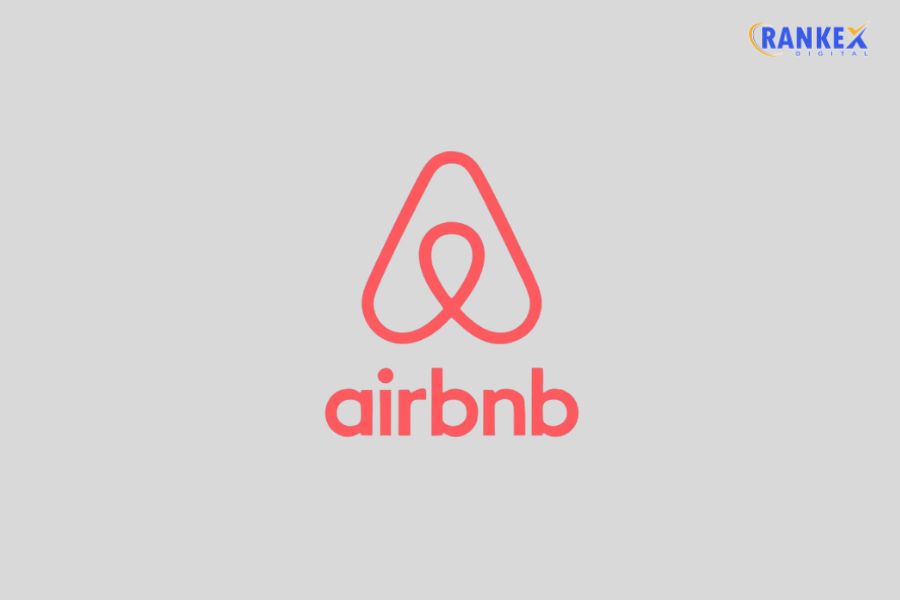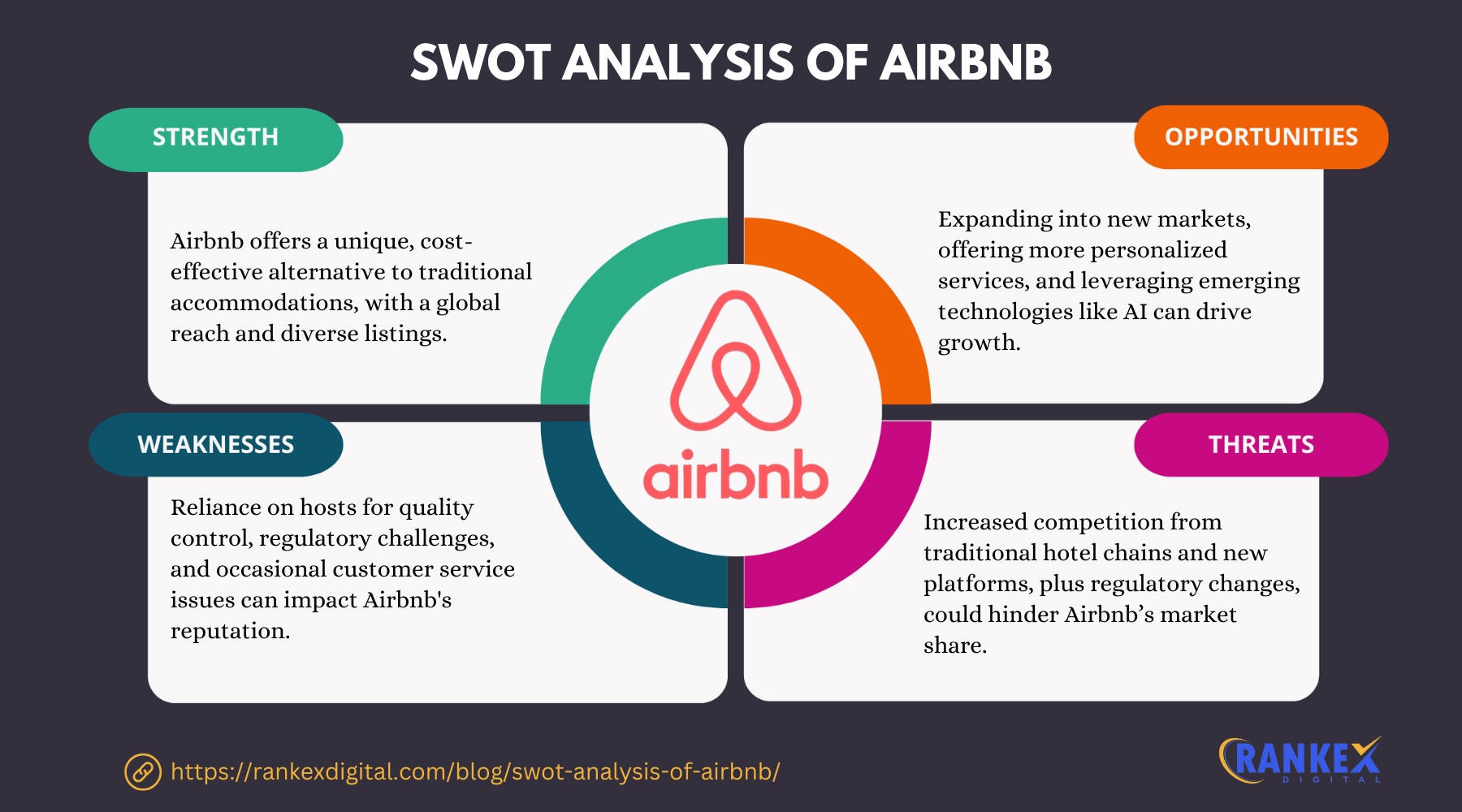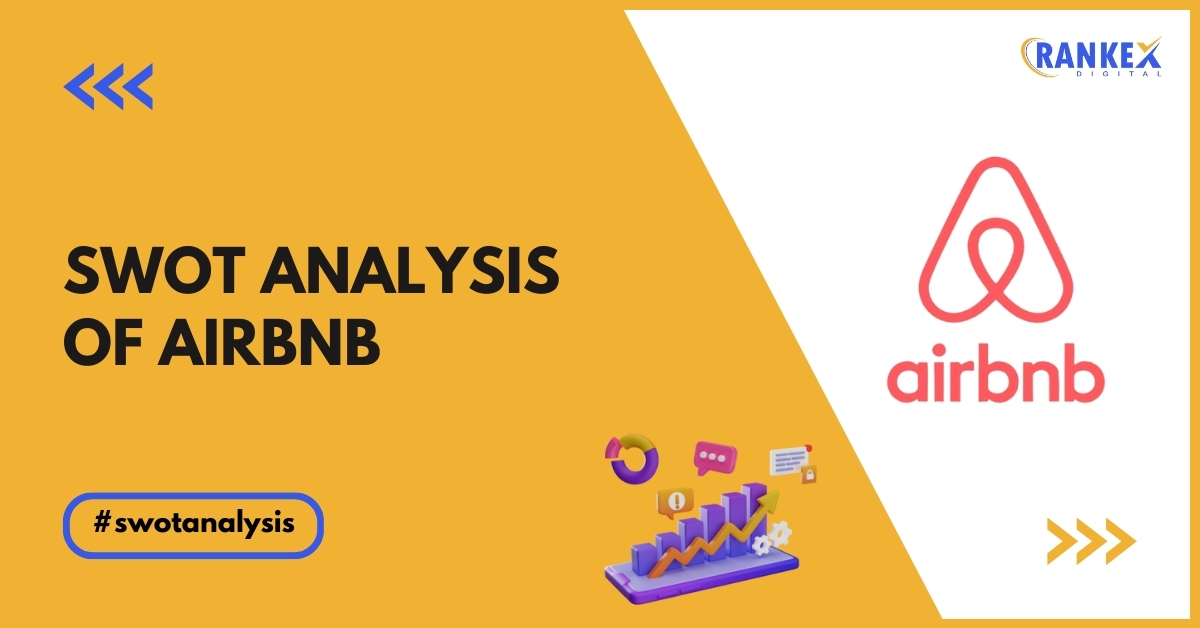Airbnb, a leading player in the global travel and hospitality industry, has transformed the way people book accommodations.
Founded in 2008, Airbnb started with a simple idea: allowing people to rent out spare rooms or entire homes to travellers. Over time, this concept has evolved into a massive global platform, connecting millions of hosts and guests around the world.
As Airbnb continues to grow, it is essential to evaluate its strengths, weaknesses, opportunities, and threats.
This SWOT analysis of Airbnb aims to provide a detailed look at Airbnb’s current position in the market and the factors influencing its future growth.
In this blog
Overview of Airbnb

Airbnb was founded by Brian Chesky, Joe Gebbia, and Nathan Blecharczyk in San Francisco, California. The company revolutionized the hospitality industry by creating an online marketplace where individuals could rent out their homes or rooms to travellers. Today, Airbnb offers a range of services beyond just accommodations, including experiences, tours, and unique stays.
Airbnb operates in over 220 countries and regions, providing a platform for millions of hosts and guests to connect. The company’s success is built on the trust between hosts and guests, the ease of use of its platform, and its growing brand recognition worldwide.
Quick Stats About Airbnb
| Attribute | Details |
|---|---|
| Founder | Brian Chesky, Joe Gebbia, Nathan Blecharczyk |
| Year Founded | 2008 |
| Origin | San Francisco, California, USA |
| Number of Employees | 6,000+ |
| CEO | Brian Chesky |
| Company Type | Private |
| Market Cap | $80 Billion (as of 2024) |
| Annual Revenue | $8.5 Billion |
| Net Profit | $1.9 Billion |
Current News of Airbnb
- Sustainability Initiatives: Airbnb has been focusing on promoting sustainable tourism by encouraging eco-friendly accommodations and experiences.
- Expansion of Airbnb Experiences: The company continues to grow its “Experiences” offering, allowing travellers to book local tours, activities, and events hosted by locals.
- Regulatory Challenges: Airbnb faces ongoing regulatory challenges in several cities around the world, where governments are imposing restrictions on short-term rentals.
- Focus on Digital Transformation: Airbnb is investing in artificial intelligence (AI) and machine learning to enhance user experience, improve search algorithms, and optimize pricing.
SWOT Analysis of Airbnb

Strengths of Airbnb
- Global Presence: Airbnb operates in over 220 countries, which provides it with a massive international footprint. This global presence allows Airbnb to cater to travellers from diverse regions and offer a wide range of accommodation types—anything from a budget-friendly shared room to luxurious villas. This vast geographical coverage also enables Airbnb to tap into different cultural preferences, making it adaptable to various travel needs.
- Strong Brand Recognition: Airbnb is one of the most recognized names in the travel and hospitality industry. Its reputation for providing unique, personal, and often more affordable accommodations has solidified its position as a leader in the market. The company’s widespread popularity also means that many travellers trust Airbnb as their go-to platform for booking stays, whether it’s for a quick weekend getaway or a long-term vacation.
- Innovative Platform: Airbnb’s platform, including its website and mobile app, is easy to navigate and user-friendly. The review system adds transparency and trustworthiness, allowing guests to make informed decisions based on the experiences of previous customers. This system also motivates hosts to maintain high standards in their properties to ensure positive reviews.
- Diverse Offerings: In addition to accommodations, Airbnb offers “Experiences,” which include activities like guided tours, cooking classes, and local events. This diversification has allowed the company to tap into the broader travel market, appealing to people looking for not only a place to stay but also a more immersive travel experience.
- Flexible Business Model: Airbnb doesn’t own the properties listed on its platform, which minimizes its capital investment. Instead, it relies on independent hosts who provide accommodation, while Airbnb takes a commission. This model allows the company to offer a wide range of lodging options—from private rooms in shared apartments to entire homes—without the financial burden of owning real estate.
Weaknesses of Airbnb
- Regulatory Issues: Many cities and countries have introduced, or are considering, stricter regulations for short-term rentals. These include zoning laws, limits on how many nights a property can be rented, and higher tax rates for hosts. Such regulations can limit Airbnb’s growth and create challenges for hosts who must navigate these legal complexities.
- Dependence on Hosts: Airbnb’s success relies heavily on the quality of its hosts. If a host does not meet guests’ expectations or violates Airbnb’s policies, it can lead to poor reviews, customer dissatisfaction, and reputational damage. As the company expands, maintaining consistency in host quality becomes an increasingly difficult task.
- Customer Service Challenges: As Airbnb’s user base grows, so does the demand for customer support. Handling disputes, cancellations, and refunds effectively has been a challenge. Inefficient or delayed customer service can result in negative reviews and dissatisfaction, impacting the overall customer experience.
- Security Concerns: Incidents involving safety issues—such as theft, property damage, or host/guest misconduct—pose a significant threat to Airbnb’s brand image. Although Airbnb has measures in place to mitigate risks, the platform’s reliance on users who are not professionally trained in hospitality can lead to problems that tarnish its reputation.
- Seasonality of Business: Airbnb’s business is subject to fluctuations based on seasons and travel patterns. For example, demand may decrease during off-peak seasons in certain regions, leading to decreased bookings. This seasonality can affect profitability, especially in markets with high seasonal variability.
Opportunities for Airbnb
- Expanding into New Markets: There is significant growth potential in emerging markets, especially in Asia, where rising middle-class populations are increasingly interested in travel. Expanding Airbnb’s presence in these regions could provide an opportunity to tap into new customer bases and benefit from growing demand.
- Increase in Long-Term Rentals: The rise of remote work and the growing trend of digital nomadism presents an opportunity for Airbnb to expand its long-term rental offerings. Travellers who work remotely may seek extended stays, creating a new avenue for growth as they look for flexible, short-term housing options for months at a time.
- Partnerships and Collaborations: Collaborating with airlines, travel agencies, and other hospitality businesses can help Airbnb expand its offerings and reach a larger audience. These partnerships can provide cross-promotion opportunities, where users are introduced to Airbnb through other travel-related services.
- Sustainability Trends: As consumers become more environmentally conscious, there is growing interest in sustainable travel. Airbnb can tap into this by promoting eco-friendly accommodations and supporting hosts who follow sustainable practices. This can differentiate the brand in an increasingly environmentally aware market.
- Technological Innovation: By leveraging AI and machine learning, Airbnb can enhance its platform’s functionality. This includes improving search algorithms, personalizing recommendations, optimizing pricing, and enhancing security measures. Technology innovation can help Airbnb stay competitive, improve efficiency, and increase user satisfaction.
Threats to Airbnb
- Intense Competition: The short-term rental market is highly competitive, with other platforms like Vrbo, MMT, Booking.com, and Expedia offering similar services. Additionally, traditional hotels are increasingly adopting digital platforms and loyalty programs to compete with Airbnb’s unique offerings, adding pressure to maintain market share.
- Regulatory Risks: Airbnb faces ongoing risks from governments introducing regulations that restrict short-term rentals. In some cities, these regulations have already resulted in fines for hosts, reduced rental days, and increased scrutiny of Airbnb’s business model. These regulatory challenges can limit Airbnb’s growth, particularly in cities where it has a large presence.
- Economic Downturns: In times of economic uncertainty, discretionary spending on travel tends to decrease. A global recession, for example, could reduce demand for vacations and business travel, impacting Airbnb’s revenue and growth. Economic downturns can also affect disposable income, making people more likely to cut back on non-essential travel.
- Public Perception and Safety Issues: Negative publicity resulting from safety incidents, like theft or accidents, could damage Airbnb’s brand and erode user trust. While the company works to address these concerns, any widely publicized incident could have long-lasting effects on its reputation and customer base.
- Market Saturation: In some mature markets, Airbnb faces challenges related to market saturation. As more hosts join the platform, competition for guests increases. This saturation can make it harder for new hosts to attract guests or for Airbnb to continue expanding its user base in certain regions.
Conclusion
The SWOT analysis of Airbnb highlights its strengths, such as its global presence, strong brand recognition, and innovative platform. However, the company faces challenges like regulatory issues, customer service concerns, and dependence on hosts for quality control.
Opportunities for Airbnb lie in expanding into new markets, increasing long-term rentals, forming strategic partnerships, and capitalizing on sustainability trends. However, the company must navigate threats from competition, economic fluctuations, and regulatory risks.
By addressing its weaknesses and leveraging its strengths, Airbnb can continue to lead the short-term rental market while adapting to changing market dynamics.
Frequently Asked Questions
How does Airbnb ensure the safety of its users?
Airbnb has a variety of safety measures, including verified IDs, secure payment methods, 24/7 customer support, and a comprehensive review system to ensure both hosts and guests have a safe experience.
What are Airbnb’s fees for hosts and guests?
Airbnb charges hosts a service fee of around 3% for each booking, while guests typically pay a service fee ranging from 5% to 15%, depending on the booking details.
How does Airbnb compete with traditional hotels?
Airbnb differentiates itself by offering unique and diverse accommodations, often at more competitive prices than traditional hotels. Its flexibility and local experiences also attract many travellers.
What are the benefits of becoming an Airbnb host?
Hosts can earn additional income by renting out their properties or spare rooms. Airbnb provides an easy-to-use platform with access to a global audience, making it simple for hosts to list their spaces and manage bookings.
Can Airbnb be used for long-term rentals?
Yes, Airbnb offers options for long-term stays, typically for durations of 28 days or more, catering to travellers, remote workers, and digital nomads looking for temporary housing.











